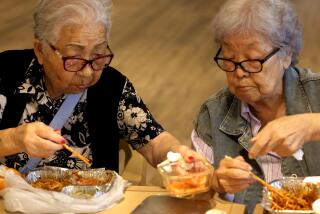L.A. Lubavitch Jews Take Food Mission to Moscow’s Elderly : Outreach: Charity effort aims to assist 4,500 Jews and non-Jews during the New Year celebration, Rosh Hashanah, next week.
- Share via
MOSCOW — It looked like a scene repeated a thousand times a day here in this city of long lines: Dozens of grumbling Muscovites, hunched over against a brisk autumn wind, stood waiting outside a drab green building.
But this crowd was made up of elderly people, and as each approached the front of the line, it was clear that this was not a typical shoppers’ queue.
“Zei gehzoont!” said a smiling man in his mid-20s, using the Yiddish words for “Be healthy,” as he handed each retiree a huge brown paper sack brimming with food.
“Hashem yevarekh otkha!”-- or “God bless you” in Hebrew--cried another volunteer, who wore the traditional skullcap of observant Jews. “May your New Year be sweet like honey.”
This week, packages of specially selected holiday foods were handed out, free of charge, to some 4,500 Jewish and non-Jewish elderly people at Moscow’s Poliakoff Synagogue.
The charity effort, sponsored by a Los Angeles-based organization of Lubavitch Jews, Chabad of California, was aimed at helping Moscow’s Jewish community prepare for the New Year celebration, Rosh Hashanah, next Monday and Tuesday.
Every week, the synagogue distributes some 600 packages of humanitarian aid, which meet only a fraction of the need. It was private contributions from Californians that made it possible to provide every person on the temple’s list with a New Year’s package.
The food distribution program is part of the Lubavitchers’ multifaceted effort to rebuild a Jewish sense of identity in Russia, which has been maimed after centuries of persecution under the czars and commissars.
“People here absolutely know nothing (about their Judaism), and it’s a real shame,” exclaimed Levi Y. Cunin, 21, a Lubavitcher from Westwood, who was in charge of the food distribution.
Cunin, whose father, Boruch, is the synagogue’s rabbi, said that he routinely encounters Russian Jews who lack even a rudimentary understanding of the religion.
“I ask people if they’re a Jew and they say, ‘Yes, I’m a Jew.’ So I say, ‘Do you want to wrap tefilin ?’ (to strap on phylacteries during prayer, as Orthodox Jewish men are supposed to do every morning), and they say, ‘What’s tefilin ?’”
The ultra-Orthodox Lubavitch missionaries, members of a Hassidic sect who wear distinctive beards, somber suits and broad-brimmed hats, arouse controversy within the U.S. Jewish community because of their aggressive outreach program. But the Muscovites waiting for food seemed subjected to gentle proselytizing at most.
“Were you born in Israel?” retired teacher Zina N. Belkina, in her early 60s, asked Cunin as she picked up her package of flour, sugar, canned tuna and--to signify the sweetness of the coming year--raisins, apples and honey.
“In America--California,” Cunin answered.
“Oh, I want to move to America,” Belkina exclaimed, “I have many relations there.”
“Look, go to Israel,” Cunin implored. “In Israel, your whole family is there--all the Jews.”
The synagogue is trying to educate its flock about its Yiddishkeit-- or Jewish heritage--in numerous ways.
There is, for example, Dial-a-Story, which Russian-speaking children can phone to hear a lively tale from Jewish lore.
On the second floor of the synagogue, not too far from the Moscow McDonald’s, finishing touches are being put to a museum of Jewish culture, where glass display cases will explain the faith’s tenets and traditions.
The older Cunin has also spearheaded an effort, unsuccessful so far, to get the Soviet--and now the Russian--governments to return to the Lubavitchers nearly 12,000 sacred books seized by the Communists and now sitting in the Russian State Library.
Few of the elderly picking up their packages seemed to care about religious matters.
Most just wanted to get their package and--assuming they could lift the nearly 20 pounds of food--carry it away.
Nevertheless, the retirees, who perhaps are hardest-hit by Russia’s runaway inflation and economic chaos, were grateful.
“Sometimes we come here and get these foods because we can’t live on our pensions. It’s terrible now,” said Marina A. Robkin, a retired elementary school teacher. Her pension, the ruble equivalent of just $7 a month at current exchange rates, when added to the $10 received by her husband, a retired doctor, leaves them with only half the money the government estimates it takes a couple to buy life’s necessities.
“This is a great help,” said Robkin, pointing to the bag of groceries bought with donations from faraway California. “Thanks to all the Jews.”
More to Read
Sign up for Essential California
The most important California stories and recommendations in your inbox every morning.
You may occasionally receive promotional content from the Los Angeles Times.










